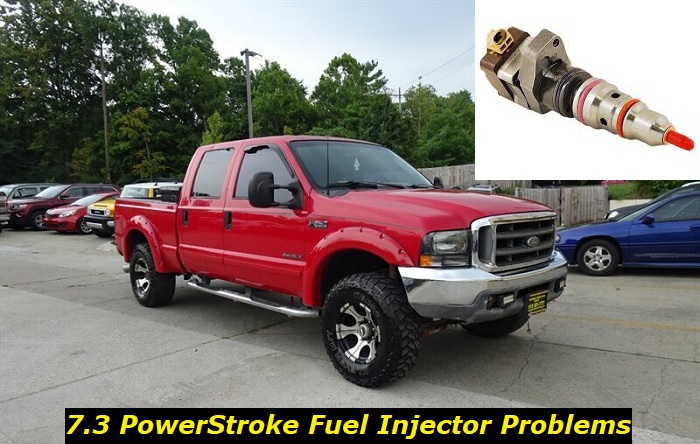Recognizing the symptoms of a potential problem in a 7.3L engine is an essential task for any automotive professional, owner, or enthusiast. Symptoms can tell you valuable information about the issue and its underlying cause, helping to diagnose the problem and get it fixed quickly.
Key features and my opinion about the engine
- Production years:1994-2003
- Average lifespan of 7.3 Power Stroke:380,000-450,000 miles
- Fuel supply type:direct injection
- Power range:250-275 hp
- Fuel efficiency:bad
- Engine block material:cast iron
- Engine reliability score:high
- The most common problems:electronics problems, wiring issues, pretty bad fuel economy.

Identifying the Symptoms of a Bad Injector in the 7.3L Engine
The first step in diagnosing the various causes of a bad injector in the 7.3L engine is to identify the general symptoms that indicate it may be faulty. If you experience any of these issues, then it's likely an injector problem:
1. Loss of Power
If your 7.3 Powerstroke engine suddenly loses its power and acceleration, this could be a sign of a bad injector. A decrease in fuel economy can also sometimes accompany this symptom.
2. Rough Idle
Your vehicle may shake or jerk while idling, with the RPMs changing erratically at times. This indicates that one or more cylinders are not receiving enough fuel when they should be.
3. Misfiring
When one or more cylinders misfire during acceleration, it's a strong indicator that one of the fuel injectors is not doing its job.
4. Engine Stalling
If your engine stalls or hesitates unexpectedly while driving, this could be due to an issue with the fuel injector.
5. Excessive Smoke
If you notice excessive grey or black smoke coming from the exhaust pipe, then the cause may be a bad injector allowing too much fuel into the combustion chamber.
These are some of the most common symptoms associated with a bad injector in a 7.3L engine. Once these signs have been identified, further diagnosis can begin to determine what is causing them and how best to fix them.
How to fix injector problems in your 7.3 Power Stroke?
Here are five steps to help you dive in on the specific cause of a fuel injector problem with the 7.3L engine:
1. Check for Fuel Flow
This is one of the most important steps in diagnosing an injector issue. If your 7.3L Powerstroke has a low or inconsistent fuel flow, then it's likely due to a faulty injector restricting the amount of fuel entering the engine.
2. Test for Pressure Leaks
If you notice any visible leaks in your 7.3L engine, then this could indicate a problem with the fuel pressure regulator or injectors themselves, resulting in low pressure when they should be operating at high levels.
3. Inspect the Fuel Return Line
An excess of fuel coming back into the return line can be indicative of a bad injector, as the faulty injector will be sending too much fuel into the engine.
4. Inspect and Clean Injectors
Make sure to inspect each of the injectors for any clogs, dirt, or debris that could be obstructing fuel flow. It's also a good idea to clean them with a specialized cleaner to ensure they are operating efficiently.
5. Replace Worn Parts
If you discover any worn parts in your 7.3L engine, such as O-rings or seals, then these should be replaced immediately to prevent further damage and reduce repair costs in the long run.
Avoiding problems with injectors in your 7.3L engine
By following these five steps and paying attention to potential symptoms, you can diagnose and fix most issues associated with a bad injector in the 7.3L engine. If any problems arise that are beyond the scope of your expertise, then it's best to seek the help of a professional mechanic who has experience working with this type of engine. That way you can be sure that your vehicle is running properly and safely at all times.
Additionally, regular maintenance should be carried out on your 7.3L Powerstroke engine to ensure optimal performance and reduce wear and tear over time. This includes changing the oil and filters regularly, as well as having an experienced technician inspect components such as fuel lines, spark plugs, fuel injectors, etc., for any signs of damage or deterioration. Taking these preventive measures will save you from much more serious repairs down the line.
Overall, diagnosing and fixing a bad injector in a 7.3L engine is not an easy task but it can be done with proper knowledge and guidance. By paying attention to warning signs, using the right tools and techniques, and seeking help from a professional mechanic when needed, you can get your vehicle running as good as new again in no time.
Important Role of the Fuel Injectors in a 7.3L Engine
Fuel injectors are an essential component of any internal combustion engine. In the case of a 7.3L diesel engine, they play a key role in providing fuel to the cylinders at precisely the right time and pressure needed for combustion. Through a carefully-timed process known as "injection", each injector sends an exact amount of pressurized fuel into its assigned cylinder when it is needed most. This helps to ensure optimal performance and efficiency from your vehicle over time.
In addition to their primary function, fuel injectors also help maintain clean air quality standards by only releasing the exact amount of fuel needed for each cycle-no more or less. This prevents excess unburned fuel from entering the exhaust system which can potentially cause environmental damage. Furthermore, injectors can also help keep your engine running cooler by helping to regulate the temperature and pressure of combustion within the cylinders.
It is therefore clear that fuel injectors are an essential part of any 7.3L diesel engine and should be regularly inspected and maintained to ensure optimal performance over time. Failure to do so may result in serious engine failure or other costly repairs down the line. With proper care, however, you can rest assured that your vehicle will stay safe on the road for many years to come.
In summary, fuel injectors play a critical role in providing precise amounts of pressurized fuel into each cylinder at exactly the right moment needed for combustion in a 7.3L diesel engine. They also help to maintain clean air quality standards and regulate combustion temperatures, thus ensuring optimal performance from your vehicle over time. Furthermore, regular maintenance such as cleaning and replacing worn parts can help ensure that your injectors are functioning properly. With all this in mind, it is easy to see why proper care of fuel injectors in a 7.3L engine is so important for the longevity of your vehicle and its complete performance on the road.
Benefits of Properly Working Injectors in a 7.3L Engine
Addressing the problems related to fuel injectors without much delay can help guarantee the following for your vehicle:
1. Improved Fuel Efficiency
Properly functioning fuel injectors help ensure that your engine is running as efficiently as possible, thus reducing your vehicle's fuel consumption in general. This helps to save you money on fuel costs over time and may even qualify you for certain tax rebates or other incentives related to fuel efficiency.
2. Cleaner Exhaust Emissions
By only releasing the exact amount of pressurized fuel needed for each cycle, injectors help prevent unburned fuel from entering the exhaust system which can cause environmental damage when released into the atmosphere. Lower emissions also make it easier for your vehicle to pass emissions tests in some areas.
3. Reduced Engine Wear and Tear
By helping to regulate the temperature and pressure of combustion within the cylinders, fuel injectors can help reduce engine wear and tear caused by excessive heat or pressure buildup over time. This can help extend the life of your vehicle significantly.
4. Smoother Driving Experience
With a properly functioning fuel injection system, you can expect a smoother driving experience due to improved performance and more consistent power delivery from your engine.
5. Cost Savings
Injectors that are regularly inspected for signs of wear, cleaned as needed, and replaced when necessary can save you from much more serious repairs down the line. Taking these steps also helps to ensure optimal performance from your 7.3L diesel engine over time.
In a nutshell, fuel injectors play a critical role in providing precise amounts of pressurized fuel into each cylinder at exactly the right moment needed for combustion in a 7.3L diesel engine. With proper care, you can rest assured that your vehicle will remain safe and efficient on the road for many years to come.
It is therefore important to regularly inspect and maintain your fuel injectors to ensure optimal performance from your 7.3L diesel engine over time. This should include cleaning the injectors as needed, replacing any worn-out parts, and checking for any signs of leakage around the seals or other components. Taking these steps can help prevent costly repairs down the line and keep your vehicle running smoothly for many years to come.
By following a few simple maintenance tips, you can ensure that your 7.3L diesel engine remains in peak condition throughout its lifespan. Doing so can not only save you from major repairs but also improve the overall performance of your vehicle and promote cleaner air quality. It is therefore important to keep up with regular maintenance on fuel injectors in a 7.3L diesel engine to ensure optimal results over time.
Conclusion
Ultimately, properly functioning fuel injectors are essential for any 7.3L diesel engine as they provide precise amounts of pressurized fuel into each cylinder at exactly the right moment needed for combustion. This helps reduce emissions and improve performance while also helping to extend the life of your vehicle over time. Taking care of your injectors can help you save money on fuel costs and other repair expenses while promoting cleaner air quality around you.
All these factors make proper upkeep of fuel injectors in a 7.3L diesel engine an important part of owning and maintaining any vehicle.
About the authors
The CarAraC research team is composed of seasoned auto mechanics and automotive industry professionals, including individuals with advanced degrees and certifications in their field. Our team members boast prestigious credentials, reflecting their extensive knowledge and skills. These qualifications include: IMI: Institute of the Motor Industry, ASE-Certified Master Automobile Technicians; Coventry University, Graduate of MA in Automotive Journalism; Politecnico di Torino, Italy, MS Automotive Engineering; Ss. Cyril and Methodius University in Skopje, Mechanical University in Skopje; TOC Automotive College; DHA Suffa University, Department of Mechanical Engineering






Add comment